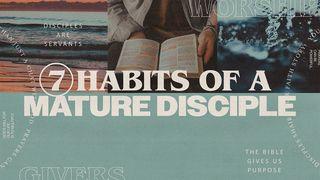On the Road Home: How to Journey SafelySample

Day 7 – The lesson of the oxen and the donkeys:
even animals know to whom they belong (Isaiah 1:1-3)
Isaiah begins with an analysis of his people’s situation. He brings to light the extremely serious conditions in which the people find themselves. And he explains that this is because people have completely ignored God’s power and now they are even turning their back on Him.
Isaiah depicts a scene similar to that of a trial, in which God summons and delivers the charges (vv. 2-4). First, He presents His case and finds the nation guilty. Then He grants the accused an opportunity to repent and to receive forgiveness. The people were like rebellious children who didn’t even have the minimum respect for God. In fact, they were worse than the animals who have respect for their owners. ’The ox knows his owner and the ass his master’s crib; but Israel does not know, my people do not consider.’ This comparison is satirical. Neither oxen nor donkeys have a high intelligence, but despite their cognitive limitations, these animals are capable of knowing who takes care of them and who feeds them. On the other hand, the people of Isaiah’s days don’t even show this scarce level of intelligence that is found among these animals.
God had fed them, He had taken care of them, but they didn’t love Him in return, nor do they care about Him. All of this was the result of wilful ignorance. Even animals like oxen and donkeys show more gratitude towards us humans for what we give them, than we feel towards the God who created us and who cares for us. Of course, there were also people in Israel who, like Isaiah and the other prophets, had a personal knowledge and experience of God (Gn 4: 1; Jer. 1:5), who realised that God gave them countless blessings and who loved and served Him in return. This was the faithful minority that inspires us Christians to recognise God as our heavenly Provider. However, even as in the people of Israel in the time of Isaiah, there are so many people among the nations – and even in the churches – who act as if God is not there.
As long as you don’t know what God wants for your life, it will be difficult for you to get along with yourself and with others.
God inspires us to trust Him, to be faithful to Him. He invites us to repent, to ask forgiveness whenever we go astray, and to come close to Him. This kind of repentance is a change of heart and the necessary requirement to walk in His ways, because when the heart is transformed, the road of sanctification opens up to us.
Manuel Díaz
Thanksgiving
We are grateful to You, O God, because we know that You have created us and that You are in control of all created things.
Thank You for encouraging us to have faith, for being patient with us, and for allowing us to come to the throne of Your grace.
Confession
We ask forgiveness for all those times when we show our pride, when we do not admit our failures and repent.
Forgive us, Lord, for all the times when we were not grateful for Your attention and when we thought that You were not taking care of us.
Requests
May we know more of You so that we can pass on Your love, Your salvation plan to others, showing them how You forgive all those who come to You with penitent hearts.
Beloved Creator, grant us that we may rest in You when we are overwhelmed by the conditions of our life. Help us then to realise that You are our Creator and our heavenly Father who watches over us.
Scripture
About this Plan

Here on earth we will have experiences of feeling at home, a sense of belonging. We are called to strive for this as much as possible, whether in our private homes or in a church community. Both are images of the heavenly HOME. That heavenly HOME will ultimately and fully fulfill all our longing.
More
We would like to thank Israel Montes for providing this plan. For more information, please visit: https://www.europeanea.org/week-of-prayer/
Related Plans

God, Turn My Worry to Worship

Christmas in the Old Testament: Prophecy Fulfilled

With God, Truly ANYTHING Is Possible

All In, All Yours: Stepping Into God’s Peace and Promises by Heidi Lee Anderson

21 Days of Prayer and Fasting: Deeper

A Mother’s Day Celebration of God’s Care

Sport Films + Faith: How Does God Speak Through These Movies?

The Promise of Light

7 Habits of a Mature Disciple
